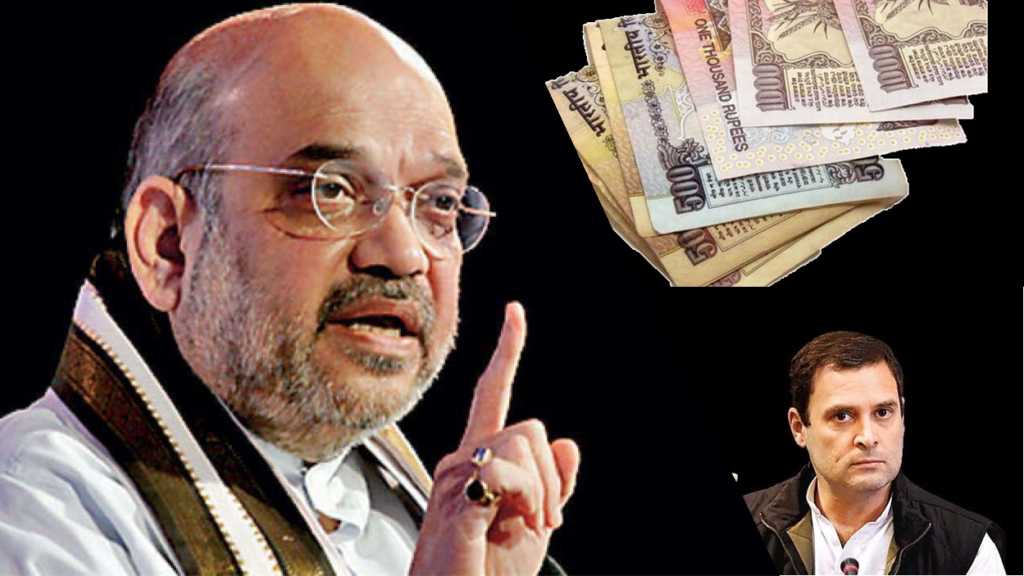The monumental decision of demonetization was taken on November 8, 2016. Due to the huge rush in private and public-sector banks on the very next day, the government allowed co-operative banks to accept demonetized notes in a notification issued on November 10, 2016. But the government soon realized that some people were laundering illegal cash through cooperative banks especially in states like Maharashtra. Therefore, in another notification issued on November 14, 2016, the government banned cooperative banks from accepting the demonetized currency. But for five days cooperative banks remained a valid destination for depositing and exchanging money.
RTI Response and Congress’ accusation on BJP President Amit Shah:
In a recent development, an RTI reply dated May 7, 2018, stated that a sum of Rs. 745.58 crores were deposited in Ahmedabad District Central Cooperative Bank (DCCB) in 5 days. The Congress party came out all guns blazing and accusing BJP of ‘huge’ illegal transactions through the DCCB. Congress in a press statement, categorically accused BJP president Amit Shah and his people of benefitting in the so-called illegal transactions. They did it simply because Amit Shah is one of the 24 directors of the bank.
So, who can be a director in a co-operative bank?
Here is a fact – Any company or bank can place any person on its Board of Directors if it thinks that they can advise them well. Except advising and attending the meetings the directors perform no executive tasks. There are 370 district cooperative banks in the country whose primary function is to provide credits to farmers at low-interest rates. The cooperative banks are regulated by the National bank for Agricultural and Rural Development (NABARD), an apex developmental institution in India.
NABARD’s response:
NABARD released a detailed ‘press release’ to debunk the propaganda spread by the Congress party and some media institutions. In its press release, NABARD said that of the total 16 lakh bank accounts of the DCCB, only 9.37 percent people deposited/exchanged the demonetized notes from the banks and of the total deposits/exchanges, 98.66 percent were below 2.5 lakhs. The average deposit amount in Ahmedabad DCCB was Rs. 46,795 which was lower than average per depositor in 18 DCCBs of Gujarat.
Source: NABARD’s press release
The scale at which the Ahmedabad DCCB operates
NABARD went on to state that during the 5 days period, the deposited/exchanged demonetized notes aggregating to Rs.746 crore accounts for only 15 % of the total deposits of the bank. That gives us an idea about the scale at which the Ahmedabad DCCB operates. The important point here is that the DCCBs of the richer states deposited/exchanged more money than DCCBs of poorer states irrespective of the government in the states. The BJP-Shiv Sena alliance ruled Maharashtra deposited/exchanged almost 4000 crores, Gujarat deposited 3700 crores while the Communist-ruled Kerala 2400 crore despite having almost half of the GDP of Gujarat.
It’s the economy, silly!
The other important point is that the farmers in the state of Gujarat and Maharashtra are relatively richer due to cash crops like Cotton and Sugarcane respectively. The per capita income in Gujarat and Kerala is five times that of Bihar and it is six times in Maharashtra. So, if people in Maharashtra and Kerala are five to six times richer than Bihar then it is obvious that DCCBs in these states will deposit/exchange more money than Bihar. If we compare per capita deposits/exchange with respect to per capita income the rates will be lower in Gujarat and Kerala in comparison to the state of Bihar.
Were the norms followed?
NABARD in its press release said that “NABARD conducted 100 % verification in Ahmedabad DCCB” which goes on to show that the bank had complied with all the KYC guidelines of the RBI while accepting the demonetized notes. Further, the verification of KYC compliance of the accounts in which the demonetized notes were deposited during the period November 10-14, 2016, including Ahmedabad DCCB were conducted as well.
Media steps out and runs back to the crease:
After the press release by NABARD News 18, Times Now, Firstpost and The New Indian express withdrew their stories because they found nothing substantial in the allegations of Congress. The Wire hasn’t retracted its story, but then they don’t really care about credibility, do they?
What an immoral thing to do?
The Cooperative banks that focus on lending to farmers and small scale rural entrepreneurs have played a huge role in strengthening the rural economy of the country. And when it comes to their banking ethics, they fare much better than some of the public-sector banks and even the glitzy private banks. The cooperative banks successfully kept the NPA issues at bay. Farmers largely depend on cooperative banks for credits to carry out routine farming activities like purchase of seeds, tractors, fertilizers etc. Congress party with its agenda to falsely defame Amit Shah is actually hurting farmers and jeopardizing their livelihoods. Cooperative banks are the lifelines of the farmers and by putting their only lender under scanner, they are hampering their day to day activities. Farmers are not going to like it for sure. Congress party must do some soul-searching and introspect at what they have been up to. Rumor mongering has already brought them to near extinction, if the party loses farmers’ support as well, PM Modi and Amit Shah’s dream of a Congress-mukt Bharat will be a reality very soon.
